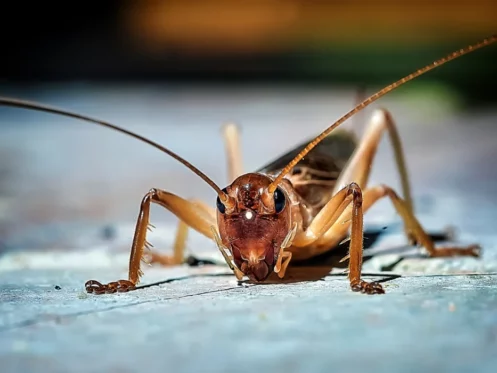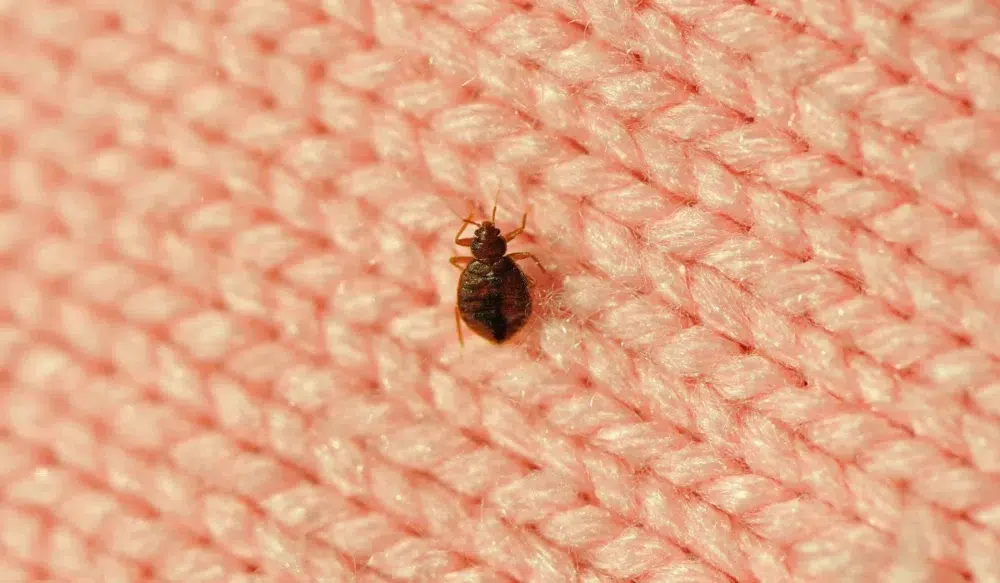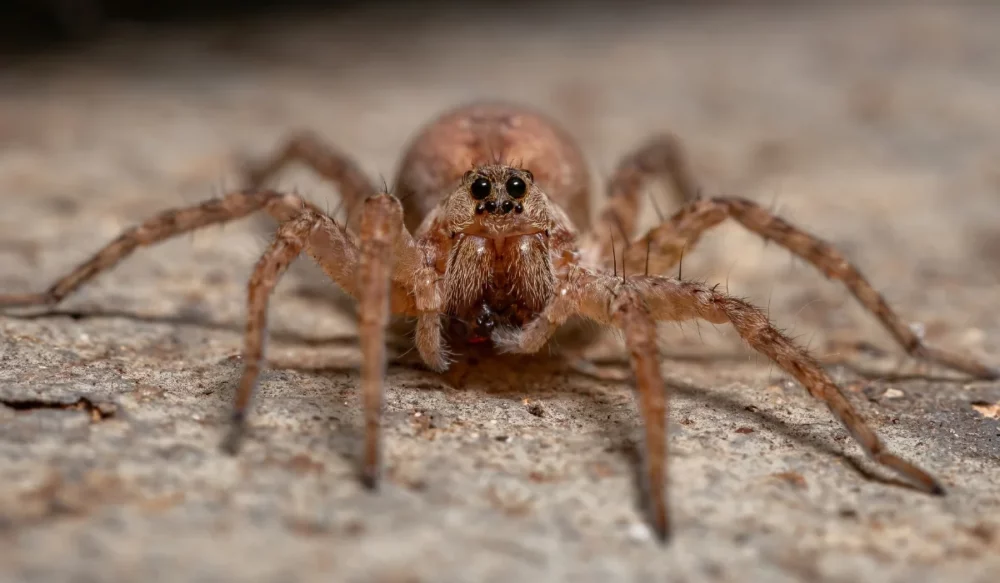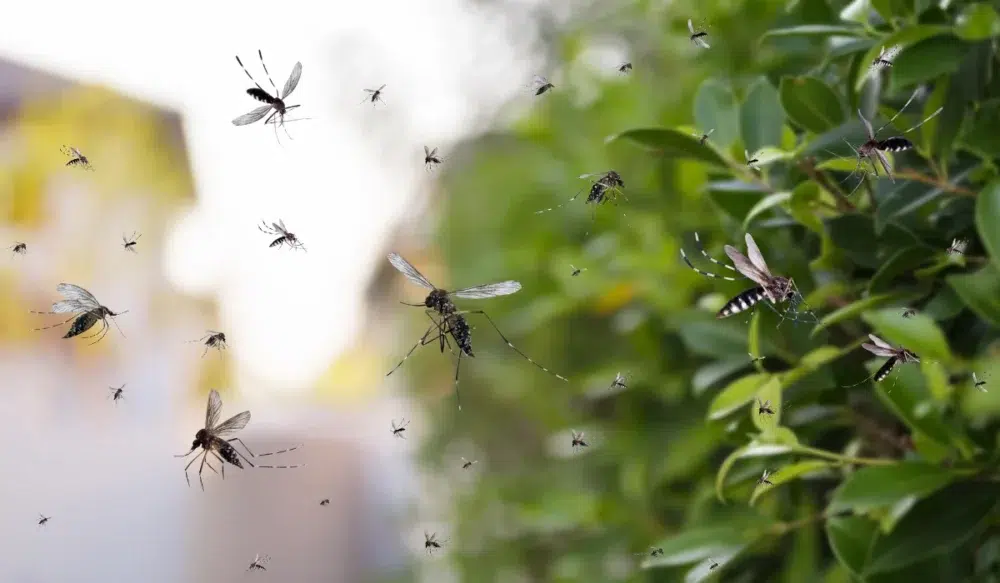Crickets chirping on warm summer nights might sound peaceful to some, but if you’re lying in bed trying to sleep and all you hear is high-pitched chirping, it quickly becomes frustrating.
Constant cricket chirping at night can mess with your sleep and even trigger anxiety, especially when the sound sneaks through your walls or windows. In Arizona cities like Phoenix, Tucson, and Chandler, where nighttime cricket activity is everyday, many homeowners deal with this exact problem.
This article provides practical tips to reduce cricket sounds and enhance your sleep.
Key Takeaways
- Crickets chirp to attract mates, and male crickets are the main culprits behind late-night noise.
- You can reduce cricket noise by sealing entry points and managing outdoor lighting.
- White noise, nature sounds, and relaxing music playlists can help mask the chirping sound.
- Pest control professionals can help manage a growing cricket population near your home.
Why Crickets Chirp at Night
That chirping sound keeping you awake? It’s made by male crickets rubbing their wings together, a process called stridulation, to attract female crickets. This behavior is most active at night, especially when temperatures are warm and humidity is higher, which is common in places like Scottsdale and Tucson during monsoon season.
You hear crickets more clearly at night because the background noise drops. Street traffic slows, human activity drops, and the night amplifies natural noises.
When Chirping Turns Into a Problem
A few crickets chirping might be tolerable. However, when you have several, the volume increases rapidly. Here’s when cricket noise crosses into being a real problem:
- You’re losing sleep night after night.
- The chirping sounds like it’s coming from inside your walls or attic.
- You notice more crickets gathering near outdoor lights.
- You’ve seen crickets, or even worse, cockroaches, in your home (they often go hand-in-hand).
If you’re hearing crickets chirping near windows, walls, or vents, chances are some may have found a way inside.
Soundproofing Tips to Sleep Through the Chirping
You can reduce outdoor cricket noise with indoor soundproofing.
Block Entry Points
Start by inspecting your home for entry points. These are small gaps around doors, windows, vents, and foundations. Use weatherstripping, caulk, or door sweeps to seal gaps and keep cricket sounds (and crickets themselves) out.
Upgrade Windows
If you live in an older home in areas like Mesa or Chandler, single-pane windows allow more noise to enter. Consider installing double-pane or acoustic-grade windows to reduce the chirping cricket soundtrack.
Add Soft Materials
Hard surfaces allow sound to travel more easily, so soft materials inside your home can help absorb some of the noise. Heavy curtains, rugs, and wall tapestries are small additions that can make a difference.
Use White Noise and Sound Masking Tools
Many people in Arizona use white noise to sleep better, especially during the active summer months.
White Noise Machine
White noise machines play steady sounds, which help your brain ignore sudden sounds like cricket chirps. Some models even come with natural sounds, such as rain, wind, or even soft bird song.
Streaming Playlists
Try a playlist on platforms like Spotify. Search for sleep sounds, relaxing music, or even cicadas and cricket sounds (oddly enough, some find these calming when they’re controlled).
You can also look for sound effects playlists that feature nature sounds, which help some people reach deep sleep faster.
Reduce Cricket Populations Around Your Home
Soundproofing helps, but long-term relief comes from addressing the source: the cricket population outside.
Outdoor Lighting Control
Outdoor lighting draws in crickets at night. Swap out bright white bulbs for yellow “bug lights” and place fixtures away from doors and windows. Turn off lights when you don’t need them; this alone can dramatically reduce cricket activity.
Declutter Your Yard
Crickets love to hide in cluttered areas. Piles of wood, rocks, or unused lawn furniture give them places to shelter. Keep your yard trimmed and tidy to make your home less inviting to them.
Check Moisture Sources
Crickets are drawn to damp spots. Fix leaky faucets, irrigation issues, or areas where water pools around your property. This is especially important in Tucson and Phoenix during monsoon season.
When to Call Pest Control
Sometimes a cricket problem becomes too much for DIY efforts. If you’re seeing house crickets indoors or noticing nightly cricket noise that doesn’t go away, it’s worth reaching out to a local expert.
At Green Home Pest Control, we help homeowners across the Valley get relief from persistent night sounds caused by insects. Our team utilizes eco-conscious, family-safe methods to manage crickets and other nighttime pests, such as cockroaches.
We also inspect for entry points, help you identify nesting zones, and offer guidance to prevent future issues. You don’t need to just “get used to” the noise. There are better solutions, and as a local company, we understand how Arizona’s climate impacts pest activity.
Final Thoughts
That peaceful chirping sound might work as ambient noise in a podcast, but not when it’s keeping you from a good night’s rest. If you live in Arizona and are tired of dealing with loud cricket noise at night, soundproofing your home and reducing cricket activity around your property are the best steps you can take.
You don’t have to suffer through it. Take small steps today and enjoy deep sleep again, even on the noisiest summer nights. Just give us a call and we will be there to solve your cricket problem.
FAQs
Why do crickets chirp more at night?
Male crickets chirp at night to attract female mates. They use a technique called stridulation, in which they rub their wings together to produce sound. Cooler nighttime temperatures also make the chirps more noticeable.
Can crickets get inside my house?
Yes, house crickets can enter through small cracks, gaps in doors or windows, or even vents. Once inside, they may hide behind appliances or in walls where the chirping can be even louder.
What sounds help block cricket noise at night?
White noise, nature playlists, and relaxing music can help mask the sound of crickets. Machines or apps that play sleep sounds, such as rainfall or wind, are beneficial for light sleepers.




